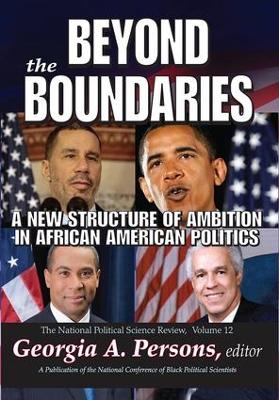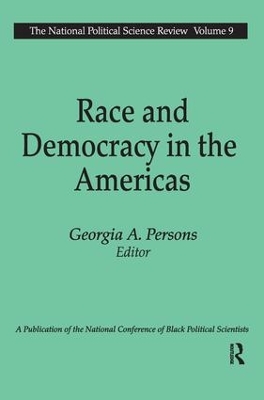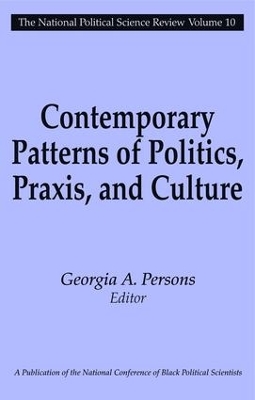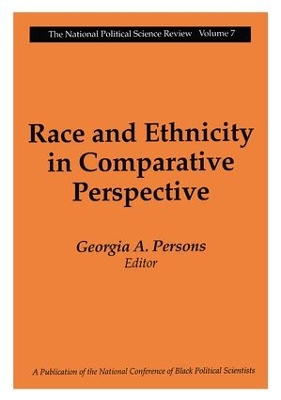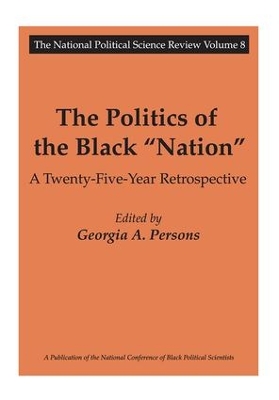National Political Science Review
5 total works
In the past, African American aspirations for political offi ce were assumed to be limited to areas with sizeable black population bases. By and large, black candidates have rarely been successful in statewide or national elections. This has been attributed to several factors: limited resources available to African American candidates, or identifi cation with a black liberationist ideological thrust. Other factors have been a relatively small and spatially concentrated primary support base of black voters, and the persistent resistance of many white voters to support black candidates.
For these reasons, the possibility of black candidates winning elections to national offi ce was presumably just a dream. Conventional wisdom conceded a virtual cap on both the possible number of black elected officials and the level of elective offi ce to which they could ascend. But objective political analysis has not always made sufficient allowances for the more universal phenomenon of individual political ambitions. Th e contributors to this volume explore the ways ambitious individuals identifi ed and seized upon strategies that are expanding the boundaries of African American electoral politics.
This volume is anchored by a symposium that focuses on new possibiities in African American politics. Both the electoral contests of 2006 and the Barack Obama presidential campaign represent an emergent dynamic in American electoral politics. Analysts are beginning to agree that the contours of social change now make the electoral successes of black candidates who are perceived as ideologically and culturally mainstream increasingly likely. The debate captured in this volume will likely inspire further scholarly inquiry into the changing nature and dimensions of the larger dynamic of race in American politics and the subsequent changing political fortunes of African American candidates.
Race and Democracy in the Americas examines dimensions of the comparative dynamics of race and ethnicity, with a directed focus on the Americas, most particularly Brazil and the United States. Brazil and the United States are two countries in the Americas that have been major hosts for the African diaspora. Both countries experienced prolonged enslavement of Africans and both now claim to be beacons of democracy for much of the developing world. Both Afro-Brazilians and African Americans have fielded major liberation movements against racism and oppression yet both groups continue to experience considerable residual racial discrimination and displacement. Brazil and the U.S. remain racialized societies though both officially purport to be otherwise.
The chapters of this volume illuminate a common search for understanding how race operates in societies generally, and how shapes life opportunities for African Americans and Afro-Brazilians, both oppressed by this most detrimental social construction. The project that fueled this volume represented a rare opportunity for collaboration between Afro-Brazilian scholars and their African American counterparts.
This volume offers a passionate conversation between colleagues who have endured common sociopolitical and cultural struggles, but who have only belatedly been able to meet and connect as individuals. Both groups share identities as scholars and activists, for neither identity alone is sufficient to nourish the longings of their hearts nor of their consciences. This volume also represents an all too rare opportunity to give voice and expression to the work of Afro-Brazilian scholars.
Volume 9 of the National Political Science Review also carries a special tribute to Mack Henry Jones, a senior black political scientist retiring from Atlanta University and honors Jones's legacy and continues his quest for understanding the nature and intricacies of oppression and possible paths to liberation. This essential work will be of particular interest to ethnic studies specialists, African American studies scholars, political scientists, historians, and sociologists.
Contemporary Patterns of Politics, Praxis, and Culture
by Georgia A. Persons
The National Political Science Review is the official publication of the National Conference of Black Political Scientists. This new volume, Contemporary Patterns of Politics, Praxis, and Culture reflects major research focuses across religion, race, gender, culture, and of course, politics. Themes that engage a community of scholars also engage them in praxis as individual citizens and practitioners in a democratic society, and collectively as member-participants in a changing culture. Two themes, religion and culture are relatively new areas of intellectual curiosity for political scientists. Articles in this volume extend the beachheads already established by African-American political scientists in studies that guage the significance and influence of religion in both individual and group behavior. They chart religion's inevitable move onto the center stage of U.S. public affairs. The study of culture has essentially languished for almost a generation within political science, especially with regard to the study of American politics and society. During this time the emphasis has also shifted significantly from an almost exclusive focus on civic culture to an expanding focus on the broad expanse of popular culture in the contemporary period. Culture is the crucible within which politics, race, religion, and gender both foment and ferment, and artistic products of the culture are manifestations and mirrors of how we envision and construct a changing reality. Issues of race, religion, gender and culture are all dimensions of individual and group identity. The dynamics of changing individual and group identities change the underlying cultural canvas against which identity is displayed and politics is acted out. The concept of praxis is relatively new to the lexicon of political science. However, engagement in the practice of politics is not a new idea for African-American social scientists. Indeed, particularly for this group, and clearly for many others, scholarship influences praxis, and praxis influences scholarship. This volume will be of particular interest to ethnic studies specialists, African-American studies scholars, political scientists, historians, and sociologists.
Contradictory forces are at play at the close of the twentieth century. There is a growing closeness of peoples fueled by old and new technologies of modern aviation, digital-based communications, new patterns of trade and commerce, and growing affluence of significant portions of the world's population. Television permits individuals around the world to learn about the cultures and lifestyles of peoples of physically distant lands. These developments give real meaning to the notion of a global village. Peoples of the world are growing closer in new and increasingly important ways.
Nonetheless, there are disturbing signs of a growing awareness of ethnic differences in all parts of the world—the United States included—and a concomitant rise in ethnic-based conflicts, many of them extraordinarily violent in nature. Fear, resentment, intoler-ance, and mistreatment of the "other" abound in world news accounts. Not only does this phenomenon pose an interesting juxtaposition to the concept of the emergent glo-bal village, but its emergence in the post-cold war era internationally and the post-civil rights era in the United States raises significant and compelling questions. Why are such conflicts occurring now? How do analysts explain these developments?
The essays in Race and Ethnicity in Comparative Perspective lucidly explore some of the complexities of the persistence and re-emergence of race and ethnicity as major lines of divisiveness around the world. Contributors analyze manifestations of race-based movements for political empowerment in Europe and Latin America as well as racial intolerance in these same settings. Attention is also given to the conceptual complexi-ties of multidimensional and shared cultural roots of the overlapping phenomena of ethnicity, nationalism, identity, and ideology. The book greatly informs discussions of race and ethnicity in the international context and provides an interesting perspective against which to view America's changing problem of race. Race and Ethnicity in Com-parative Perspective is a timely, thought-provoking volume that will be of immense value to ethnic studies specialists, African American studies scholars, political scientists, his-torians, and sociologists.
This volume of the National Political Science Review, the official publication of the National Political Science Association, is anchored by a major symposium on The Politics of the Black "Nation," the book authored by Matthew Holden in 1973, which is now considered one of the most influential books in the field of black politics. Twenty-five years provide a sufficient timespan on which to base a retrospective of the book and simultaneously to reflect upon the evolution of the black liberation struggle, more formally called, African American politics. In the present age, there is not much talk about "a black nation," certainly not as was heard during the 1960s and mid-1970s. Yet there is a persistent sense of separateness in that there is constant thought and talk of "Black America" as a significantly separate communal entity. Black Americans are seen as a racially and culturally distinct community holding to social, political, economic interests which have special significance and poignancy for them. Holden's perception of the nature of the times in the early seventies stands in sharp contrast to how contemporary analysts of African American politics tend to perceive the nature of African Americans' role in political life and their position in American society in the present age. In this retrospective, readers have the opportunity to get a sense of what Holden argued of the seven essays that make up his seminal volume and to consider how well Holden's observations have stood the tests of time. In addition to the essays presented at the symposium, which pointedly discuss Holden's work, there are essays dealing with "African American Politics in Constancy and Change," by contributors including Charles Henry, David Covin, Robert C. Smith, Clyde Lusane, Cheryl Miller, D'Linell Finley, and Sekou Franklin, among others. Other features are a highly informative discussion of the Literary Digest magazine's Straw-Vote Presidential Polls, 1916-1936, and a review essay by Peter Ronaye in which he discusses "America as 'New World' Power: U.S. Foreign Policy in the Post-Cold War Era." The volume concludes with fifteen book reviews by knowledgeable scholars. The Politics of the Black "Nation" is a timely, thought-provoking volume. It will be of immense value to ethnic studies specialists, African American studies scholars, political scientists, historians, and sociologists.
